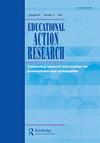我们能走多远?让学生成为重新设计教学的伙伴
IF 0.8
Q3 EDUCATION & EDUCATIONAL RESEARCH
引用次数: 2
摘要
学生作为合作伙伴(SaP)在高等教育中越来越普遍,但我们一直在努力解决如何最好地让学生参与我们作为教育者的工作的问题。在考虑SaP时,会提出关于责任、问责制和信任的问题。参与式行动研究从化学工程的入门化学模块开始,学生作为合作伙伴积极参与该模块的研究、设计和开发的各个阶段。行动研究跨越了两年的时间,包含了模块开发的两次迭代。学生合作伙伴以四种不同的方式积极参与这个过程:设定研究议程(开始),为他们的同龄人创造合适的形成性评估问题(进行中),管理其他学生设计学习工具(作为第二次迭代的一部分),以及设计和开发适当的评估。需要一些初步的结构来建立工作关系应该是什么样子,但是学生合作伙伴建设性地参与了这个过程,并为重塑模块增加了相当大的价值。最终的结果是一个更加以学生为中心的模块,在这个模块中,学生伙伴挑战现状,建设性地利用他们的经验,并真正与同龄人感同身受。本文章由计算机程序翻译,如有差异,请以英文原文为准。
How far do we go? Involving students as partners for redesigning teaching
ABSTRACT Students as partners (SaP) is becoming an increasingly common notion in higher education , but we continue to grapple with questions around how to best involve our students with the work we do as educators. Queries around responsibility, accountability and trust are raised when considering SaP. Participatory action research is presented from an introductory chemistry module in chemical engineering, whereby students were actively involved as partners at various stages of the research, design and development of the module. The action research spanned a 2-year period, accommodating 2 iterations of the module's development. The student partners actively participated in this process in 4 different ways: to set the research agenda (at the beginning), to create suitable formative assessment questions for their peers (ongoing), to manage other students in designing learning tools (as part of the second iteration), and to design and develop appropriate assessment. Some initial structuring was required to establish what the working relationship should look like, but the student partners engaged constructively with the process and added considerable value to reshaping the module. The end result was a more student-focused module, where the student partners had challenged the status quo, used their experiences constructively, and truly empathised with their peers.
求助全文
通过发布文献求助,成功后即可免费获取论文全文。
去求助
来源期刊

Educational Action Research
EDUCATION & EDUCATIONAL RESEARCH-
CiteScore
3.10
自引率
8.30%
发文量
48
期刊介绍:
Educational Action Research is concerned with exploring the dialogue between research and practice in educational settings. The considerable increase in interest in action research in recent years has been accompanied by the development of a number of different approaches: for example, to promote reflective practice; professional development; empowerment; understanding of tacit professional knowledge; curriculum development; individual, institutional and community change; and development of democratic management and administration. Proponents of all these share the common aim of ending the dislocation of research from practice, an aim which links them with those involved in participatory research and action inquiry. This journal publishes accounts of a range of action research and related studies, in education and across the professions, with the aim of making their outcomes widely available and exemplifying the variety of possible styles of reporting. It aims to establish and maintain a review of the literature of action research. It also provides a forum for dialogue on the methodological and epistemological issues, enabling different approaches to be subjected to critical reflection and analysis. The impetus for Educational Action Research came from CARN, the Collaborative Action Research Network, and since its foundation in 1992, EAR has been important in extending and strengthening this international network.
 求助内容:
求助内容: 应助结果提醒方式:
应助结果提醒方式:


